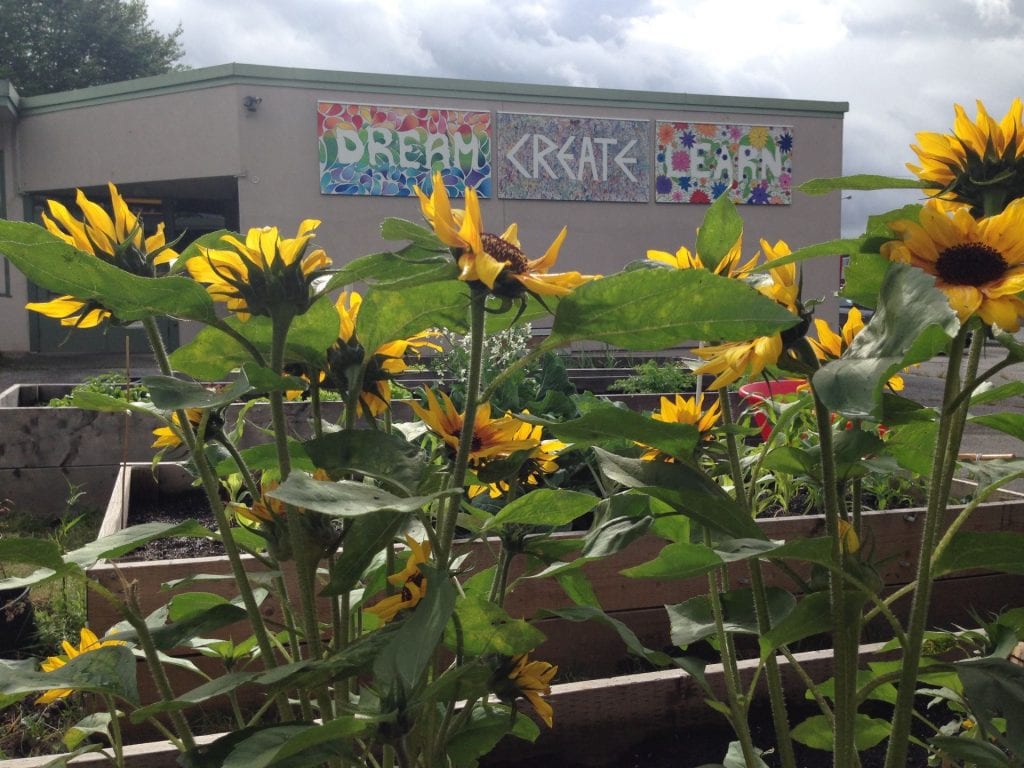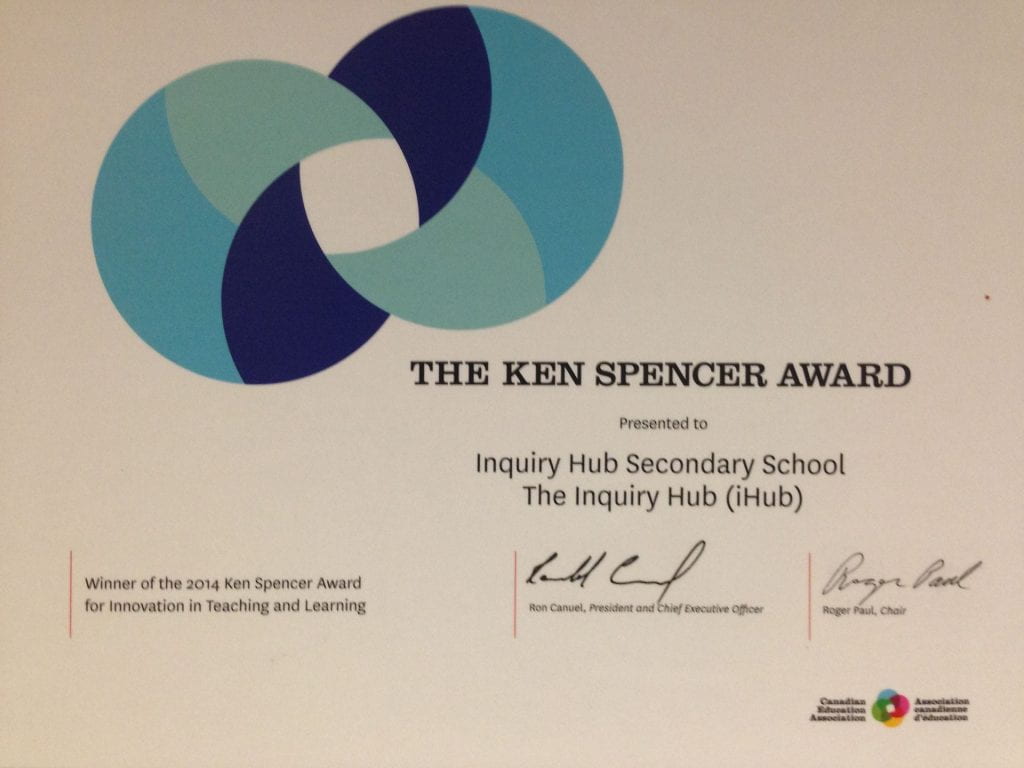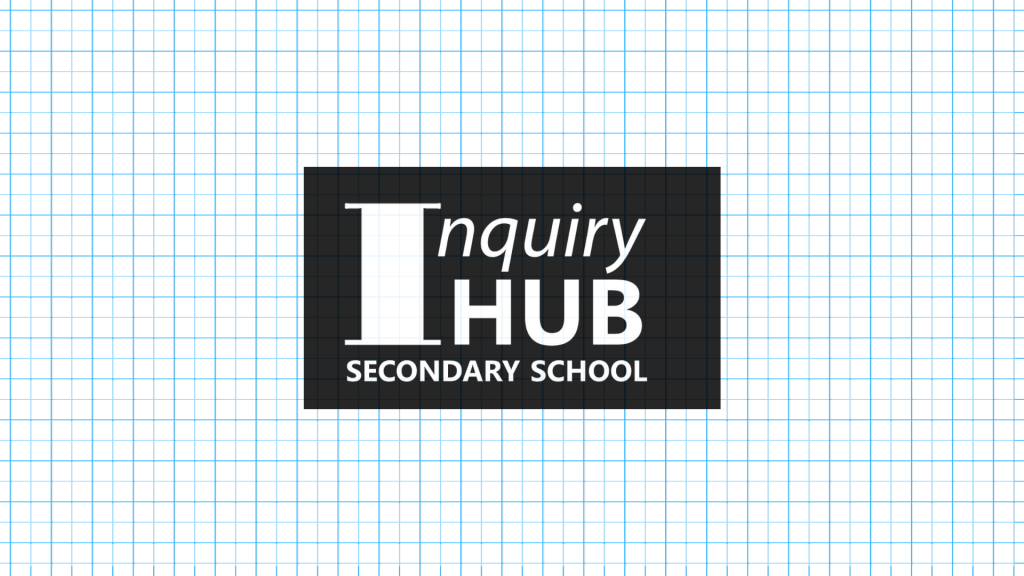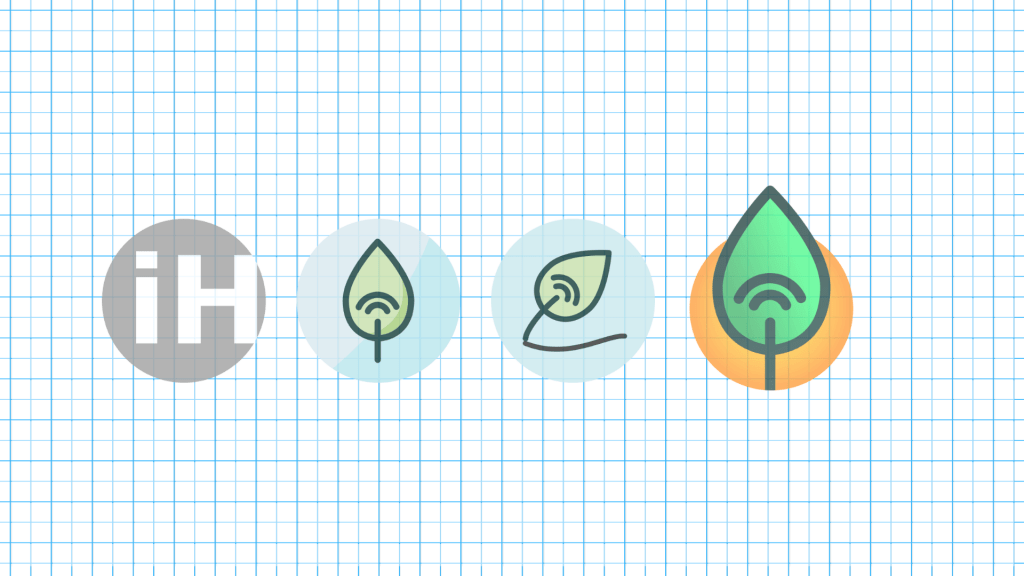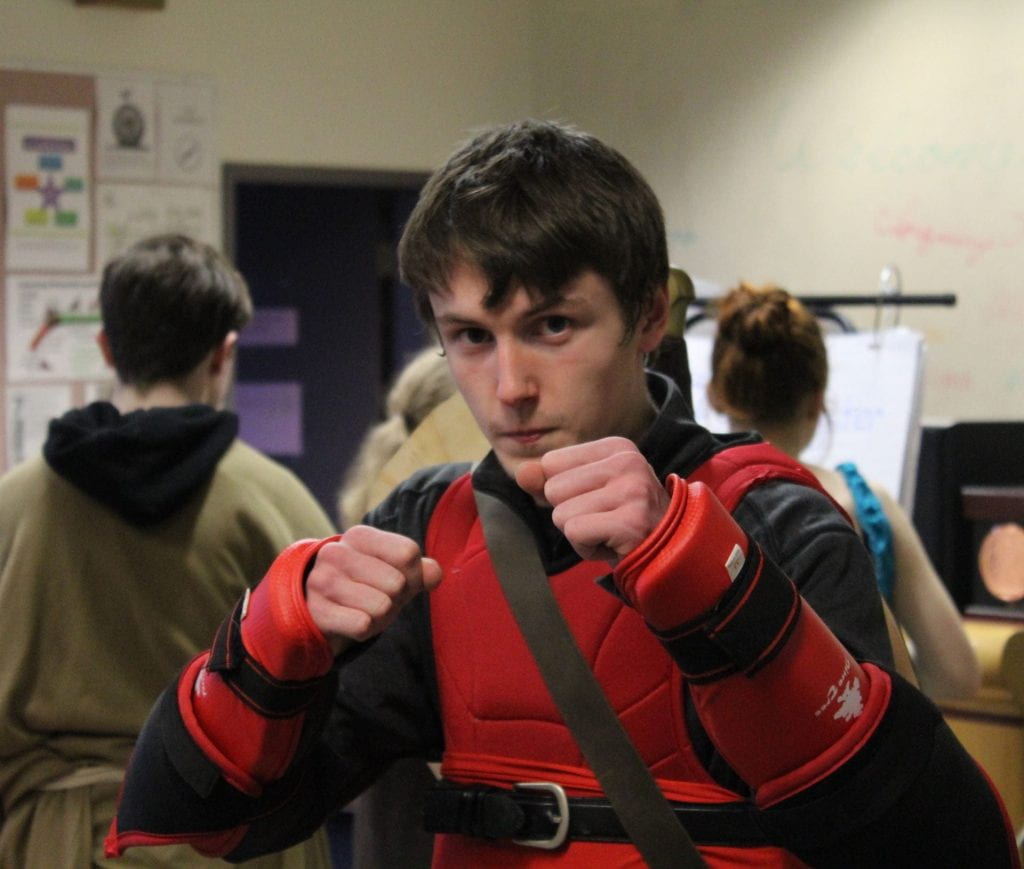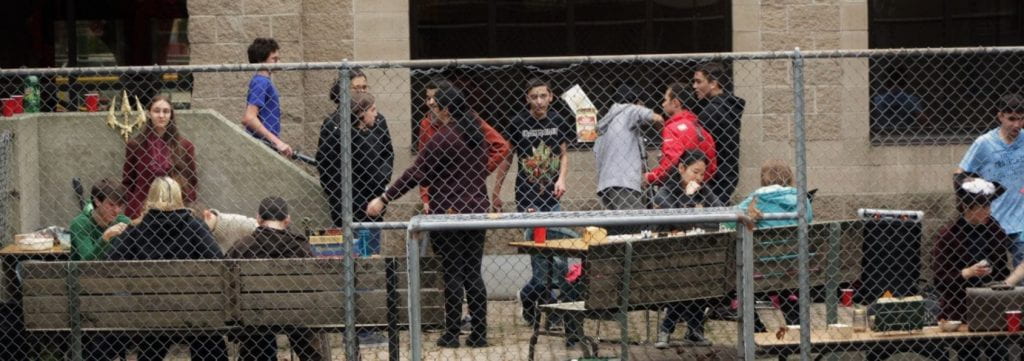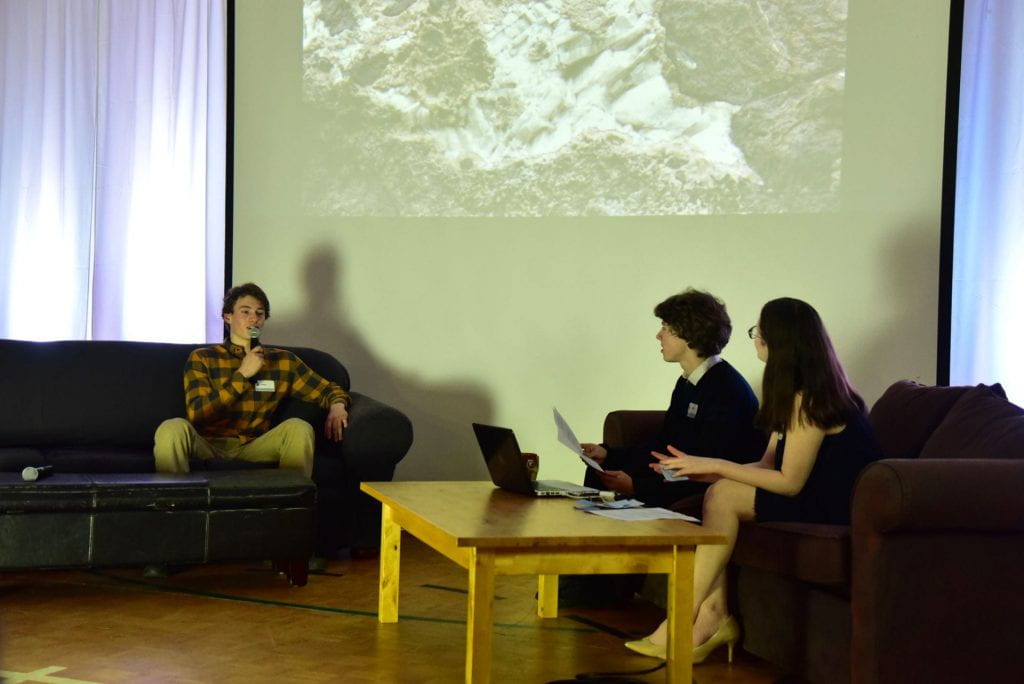Our Story
When iHub first started out, we honestly had a bit too much of a focus on learning with technology. Sure, we were doing things like the garden, but when we went places and at open houses and on our website, it was always our tech things we talked about. Yet nowadays, almost all of our students are artists of some sort. Not just painters, but musicians, filmmakers, scientists, writers, mechanics, engineers, interior designers, actors, and journalists. Because art isn’t about drawing: It’s simply about creativity.
We still use technology a lot, and there are a lot of students working on techy things, but it’s no longer about about the tech: It’s about the creativity. So how did this happen? How did our school become, in seven years, what it is now?
It’s a long story… but that’s just what it should be. If you can’t tell something as a story, it’s probably not worth telling. Our story might be a lengthy one, but it’s a telling one too. It might be a bit boring at the start, but you’ll see soon enough why that is, and why things are getting more and more exciting as time goes on. Why our story is one worth writing.
So sit back, and enjoy.
Roots and Sprouts (Year 1 — 2012-13)
In September 2012, an Inquiry Hub day began with teacher-directed seminars in the morning followed by “inquiry time” in the afternoon. Teachers worked with an individual or a group of students to develop and provide feedback on student-directed projects that also had some tangible connections to subjects such as Science, Math, and Language Arts. For example, in year one, three students demonstrated specific skills in Mathematics while learning to budget for a school garden, draw up potential garden layouts, and calculate how much lumber, gravel, soil, and plants to order. In addition, some students also studied methods of sprouting a variety of vegetables using the scientific method. Furthermore, the garden team gained experience presenting to and working with school district staff to have their plans approved. All their preparation culminated in the building of the garden by students, parents, and staff in April 2013.
This was a milestone for our school because it demonstrated a bit of what is possible when inquiry time is used at its full potential. The students leading the project were so engaged with the vision of a community garden that they spent many hours outside of school working on their project, including garden maintenance during the summer and garden-related projects in subsequent years.
As successful as the garden was, it became clear that students could not always articulate an interest we could pursue during inquiry time. We were surprised by the number of students who could not communicate a project idea. In response, we provided our own ideas. Often, these teacher-suggested projects were abandoned and left incomplete, so it was not a desirable solution. There was a disconnect and absence of a shared vision around inquiry time.
From our early experiences, we realized that iHub had to be developed further for us to claim that every school could benefit from having an Inquiry Hub.
Those First Four Years (Years 2-4 — 2013-16)
After the success of the garden, some of our students got into 3D printing and robotics, while others tinkered with games and coding. Each year, new students would find other topics of interest to share with the school. Some students were into writing and drawing, while others were more entrepreneurial. It became clear that students’ projects had to be the school’s projects. At Inquiry Hub, we would make students’ ideas come to life.
In the 2014-15 school year, flushed with the success of the garden, a group of students applied for a beautification grant from the city of Coquitlam with the goal of making the garden area look nice. They erected two picnic tables and four benches in the centre of the garden, then began painting three murals to adorn the exterior wall nearby.
They’d settled on the idea of having each mural say a single word. Together, these three words would describe iHub’s ethos, it’s vision, it’s way of learning. The students turned to the school’s slogan, “Connect Create Learn” at the time for inspiration. They liked it, but they felt that “Connect”, being a boring word used primarily by adults to describe in a boring way something that should be quite exciting, ought to instead be replaced by a different word: “Dream”. Staff disagreed with the change, finding “Dream” to be too romantic and impractical a word, but students refused to budge. “Dream Create Learn” it would be.
By the next year, Dream Create Learn had become the name for what was formerly called “inquiry time”. By now, most of the staff loved the phrase, placing it on everything and describing various aspects of iHub using it, and a year later again when we were a finalist for the Cmolik prize, it was “Dream_Create_Learn” that was the name of our contribution.
In 2015, iHub received the Ken Spencer Award for Innovation in Teaching and Learning, with $7000. But staff realised it wouldn’t make sense for them to solely decide what the money should be spent on — after all, they weren’t the ones doing the inquiries. Instead, students created pitches for what they decided the money should be spent on, and the money was packaged out accordingly. Among the purchases decided by students were a Wacom drawing tablet, a sewing machine, and a kitchen unit, all of which would be made available, unrestricted, for student use. But perhaps the most fortuitous was the acquisition of a live sound mixing desk.
In 2016, Inquiry Hub’s logo was completely redesigned by students from the drab, typographic one designed by our former principal, to a colourful, modern, and rather quite beautiful one. Along with creating this new logo, students also set down basic brand guidelines, such as font and colours, to be used in the future.
But it was near the end of 2015 that one of iHub’s most interesting features was finally introduced: That was the year we started larping.
John Sarte, iHub’s STEM teacher, had heard of a thing that had been popular in Europe for a while, but was only starting to gain traction in North America: Live action role play. Live action role play, or larp as it’s more commonly referred to as, is sort of like the tabletop role-playing games of the 80s and 90s, such as D&D, but played out in the real world. Instead, of rolling dice and shifting fantasy characters around on a map in their parents’ basement, larpers, go to a place that best fits the setting of their story, then act out characters in real life, struggling with anything from magic, to sword-fights, to evil droids.
Mr. Sarte loved the idea and wanted to see one happen at iHub. Yet when he asked a couple students he figured might be interested in it if they’d ever heard of such a thing, he found that they already did, and had already been talking about it themselves! Excited by the idea, they recruited a half dozen more students from all grades to create the setting, make props, and play the few characters who would actually know what was about to happen and would serve to move the story along. With the larp set for January of 2016, they worked every lunch break, and much of their DCL in the last few weeks, to put it all together and make it an event for the entire school.
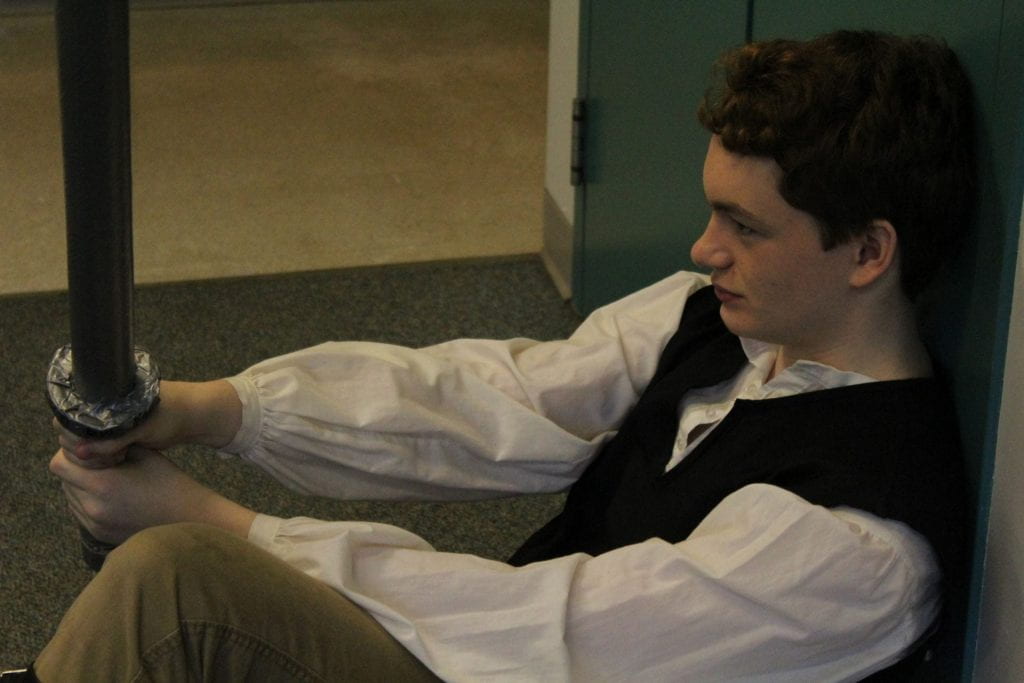
Liam’s character, sorely misled by Joey’s villain, believes that destroying the island all his friends are on is the only way to save his sister.
Inquiry Hub’s fourth year was capped off with another major milestone: Our first graduating class. The grads were going on to trades, to university, to college. Three went into applied sciences, one into culinary arts, one computer science at UBC. True, it was a small grad class — just twelve students, in fact — but each were going on to what they were passionate about; Each felt more prepared as a result of their time at iHub.
But when it came to a graduation ceremony, things would have to be done a bit differently. With such a small grad class, our grads would be crossing the stage to an empty room and the slight applause of just seven families. So, early on, the staff decided that the event wouldn’t be just a grad, but an award ceremony for the entire school as well.
Awards were handed out to students based on a few different categories: Quality inquiry and IDS projects which we felt took full advantage of the format; Stewardship (taking care of the school, its equipment, and its space); Leadership; Ambassadorship (leading tours and working on events such as our open house); and, finally, Spirit of Inquiry, a sort of iHub-time achievement award to be given to the grad or two who had accomplished the most during their four years at the school.
Revolution (Year 5 — 2016-17)
2017 was the year Inquiry Hub Secondary was a finalist for the Cmolik Prize. Our contribution was Dream Create Learn (DCL) time where 30 to 50% of a school week is reserved for the students to pursue their own creative projects. DCL was created to allow students to pursue personal interests with school support and to earn credit towards graduation. DCL is a transformation from a traditional model where students are placed in classroom/block schedules to a schedule that provides student-directed learning opportunities.
Letters of Support and Testimonials
Gordon Li, Director of Learning Technologies and District Outreach, 2016
But to be honest, that was just icing on the cake, capping off a year that had changed the look of iHub outside, and somewhat inside as well.
With the Cmolik Prize coming up later in the year, iHub’s lead administrator Dave Truss asked if a few students could start work on documenting the school, its students, and their inquiry projects, and redesign the website around these projects. Tearing down the old website and replacing it with a new, more modern inquiry-based, student-programmed one, students then created several videos explaining the different aspects of iHub and what made it interesting. They used their DCL time for filming and editing and received credit in applicable courses for their work. However, aside from the original spark of the idea, and the nudge to get it going, the layout, style, and topic of the videos was created completely by the students.
By now, the astonishing breadth and diversity of the inquiries that students could do was clear. From web comics to go-karts to marketing to film-making, students were doing it all. But with this new focus came other difficulties: With DCL being both for coursework and inquiries, teachers found that students would often put off work for other courses in favour of their passion projects. This was most apparent with language courses like French and courses that were then taught primarily online, such as maths. While one or two students would use the online nature of such courses to get all their work done early in the year, saving time for everything else, most would put it off until the very end, producing a crunch in the last weeks before the final report card. A solution would have to be found, but it was going to have to take more staff…
Our fifth year also brought us two more student-led larps. The first one, held the day after Halloween, was a medieval tournament and festival with jousting, archery, food, and board games. The second, held in the springtime, went a completely different direction: Students were cast as interns arriving at a space station commune in the far-distant future where everything is not quite what it seems. The space station is right on the front lines of the fight for droid rights and, when a virus infects the station’s AI interface, the students playing droids were given the choice to rally in favour of the humans who had subjugated them, or let the humans suffocate.
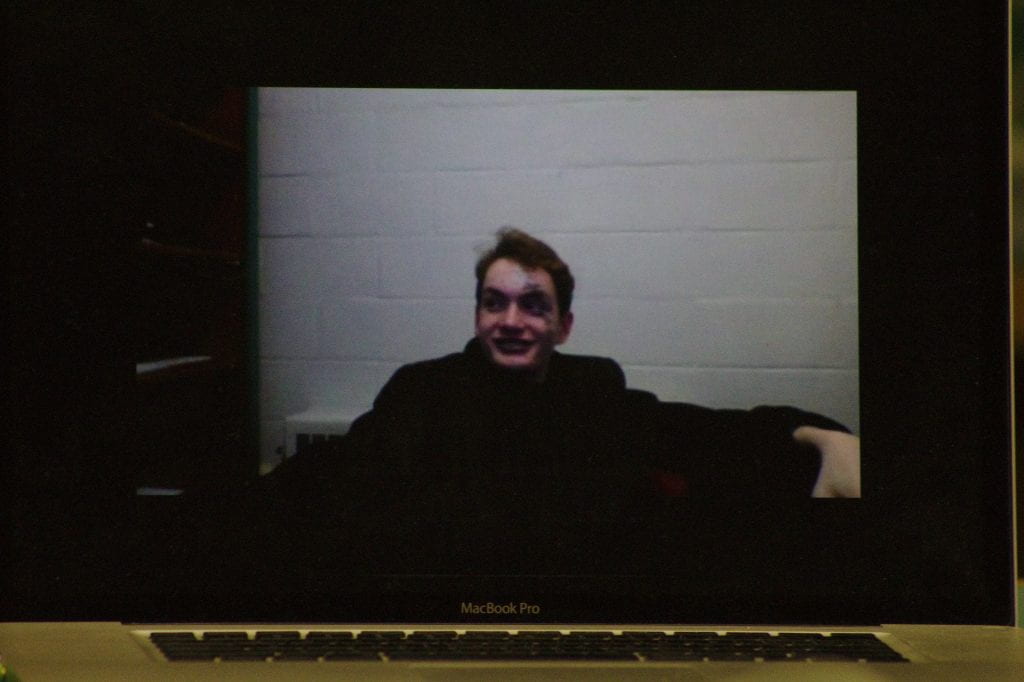
The ship’s AI interface announces its evil intentions through a network of screens in every room — the software to make this happen was created by a student during DCL.
Just as always, students met during lunch to plan, but as the dates crept ever-closer, they would take advantage of their DCL time to assemble costumes, create the software to make the space station seem sufficiently futuristic, and plan out the finer plot-points.
Later that year, when Mr. Sarte was to present on larping and its value in the classroom to teachers at a Professional Development day, he decided to bring along two of the students who’d organised the space station larp. Then, instead of spending the forty minutes presenting on larps, the three of them held one, with the teachers in attendance as players. The larp was designed as a follow-on to the space station, with teachers acting as employees from two rival companies trying to work out what had happened and gain possession of the medical and technological secrets the station had been developing.
However, the changes to our website and our logo weren’t the only ones from the last two years: Our annual open house (named iHub Open by students) had changed as well. No longer an event led solely by staff, it was students who would now present on the main aspects of the school, such as DCL and inquiry. Teachers were still there to anchor things, but the show was starting to give way to more entertainment, with videos, musical performances, and other livelier content. While staff had always envisioned the open house, designed to bring new families to iHub, as an infonight, students saw it as a show.
With that element of performance, they had also started to make the event a bigger production. Held in a space made by removing the divider between two classrooms, the entire presentation was now done on-mic, with students handling the tech. iHub Open that year began with a cold open, a video that starts the show and quiets the crowd before even a single person has gone up to speak. (Subtly, this was a chance for students, who would produce the cold open, to set the tone for the evening, long before the teachers or administrators had gone up to speak!)
Part of the impetus for this was the fact that at iHub, we were now fine with seeing students as experts in their fields. The students who were starting to take more of a lead in the open house were growing experts in marketing, public speaking, and event creation. The students running tech were experts in sound production. The students producing videos were experts in cinematography and storytelling.
Why should students wait until after high school to be experts? Why should teachers fear not knowing all the answers and instead having to ask the questions? What we’ve learned at iHub is that when students are allowed and encouraged to explore what interests them, they become knowledgeable about and capable in those fields. When they are given the time to explore further, they have the chance to teach their peers and their teachers the things they’ve learned.
By the end of the year, when we reached our second graduation ceremony, now named “iHub Annual” by the students in charge, we’d reached a new stage in student-expertise. Feeling that, if Annual was to truly be an event for the entire school, it would have to be more of a show, a performance, than the awards ceremony and set of speeches it had been the previous year, students began to reorganise how the night would look. Out went the long speeches and the number of times each award-winner would cross the stage. Instead, the night would feature, along with the graduation, three videos looking at various inquiry projects, a cold open video, two performances by a grade 12, bag-piping by a grade 10, and, at the very end, a humourous video look back at the last four years by a grad who had been collecting content since his grade nine year.
To produce the videos looking at various inquiry projects, the students in charge of the evening turned to some new grade nines and directed them to do it. No longer was it solely the teachers giving directions, but the students who had more experience were now working with those who had less, teaching them the ropes.
And, at the end of evening, we once again awarded the Spirit of Inquiry Hub award to two grads who had made the most impact. But this time, while one received it for his primarily academic achievements, the other received it for his work in leading larps for the last two years. We were beginning to understand a truth that had been driving us for the last few years, but we hadn’t fully realised until then: School shouldn’t just be about academics. It should be about citizenship, about passion, about hope for the future.
So Much Bigger (Year 6 — 2017-18)
Just before the summer of 2017, a couple of the students started pondering the future of Inquiry Hub’s promotional activities. We’d reached a sort of a saturation point where everyone who would find out about iHub the ways they could then already had, and our applications for the following year were down.
Olivia Lane, then a grade 10 student, had the solution. Years previously, a couple staff members and students had gone on occasional trips to middle schools to present about iHub. Olivia felt that these could be brought back, but with the new student-led flare. They would no longer be just presentations, but full on shows, and they wouldn’t go to just a few middle schools, but to all of them.
Come the new school year, she started work with her fellow students to pull the shows together. The team picked students out from each grade to present, scripted the presentations, and worked out how they would present what was practically the same show again and again for fourteen times. Each presentation had four or five people who could present on it, and there were two performers ready to sing and play clarinet. Each show would have different students and their presentations would differ based on their personality and experiences, but the basic content would remain the same.
Students in the Digital Media Development 11 course began producing three videos for the roadshow: two would feature various inquiry projects, and one would serve as the cold open to introduce the show and drive the message. That video, written, directed, filmed, and edited completely by students, was How Far Would You Go:
The Roadshow proved an immense success, drawing nearly 300 people to that year’s iHub Open where before, 100 people had been a good showing. With the amalgamated classrooms unable to hold even half that number, we decided two days before the show that it would have to be moved to our gym, the first time we’d ever held an event in there.
That year’s Open fully reinvented what we’d been doing. The night was divided into two sessions on the main stage, with a long period in between and after for people to drift around and talk with students and staff and see some of the amazing projects being worked on. For the first time, no adults presented at the beginning of the first session; instead one presented briefly in the middle, and our lead administrator, Dave Truss, was pushed to the very end with the direction of “wrap it up and pass it off to a student to introduce session two”. Similarly to Roadshow, entertainment was a core part of the session with performances before and during, and a brand new cold open.
The entire open house was also branded around a single, student created idea: The idea of being the hero of your own story, and of every story having its beginning. At iHub, students decided, they had the chance to be the protagonist of their own story, instead of just a side character in someone else’s plot. And, for many students, it had been the open house they’d first gone to that had persuaded them to go to iHub, so it was iHub Open that was the beginning of their story. The student-written, -directed, -filmed, and -edited cold open that started the night reflected this:
But it was the second session where we really tried something new. Olivia, and one of her fellow grade 11s, Laef, conducted an late-night television talk show-style interview session, interviewing students and staff about their projects, their dreams, and their school. For Laef, an aspiring broadcast journalist, this was also part of an IDS project he’d created for himself.
Our sixth year also changed a lot of how we taught classes. Gone was the online math and online for the younger grades! The previous year, Sophia Yu and Travis Cornwall had joined the staff, Ms. Yu teaching in-class French for grades 9 and 10, and Mr. Cornwall teaching Physics. But the following year, Mr. Cornwall expanded the classes he taught, taking on half of the maths courses, and so did Ms. Yu, taking on humanities courses for the younger grades as well.
In Ms. Yu’s case, this allowed for more flexibility with class time, and more coherent teaching between courses. And, with her teaching French in person, students could gain a better understanding for the language and better fluency with it, something that is always lacking in online language courses.
In Mr. Cornwall’s case, while he still taught using the online materials as a guide and in lieu of a textbook, the tutorials and lessons he offered in class ensured students understood the material, and the assignments and projects with hard deadlines that he offered served to keep students more on pace with the material and the rest of the class. Mr. Cornwall also introduced tutorial times where students could come to work and ask questions or take tests and exams if need be.
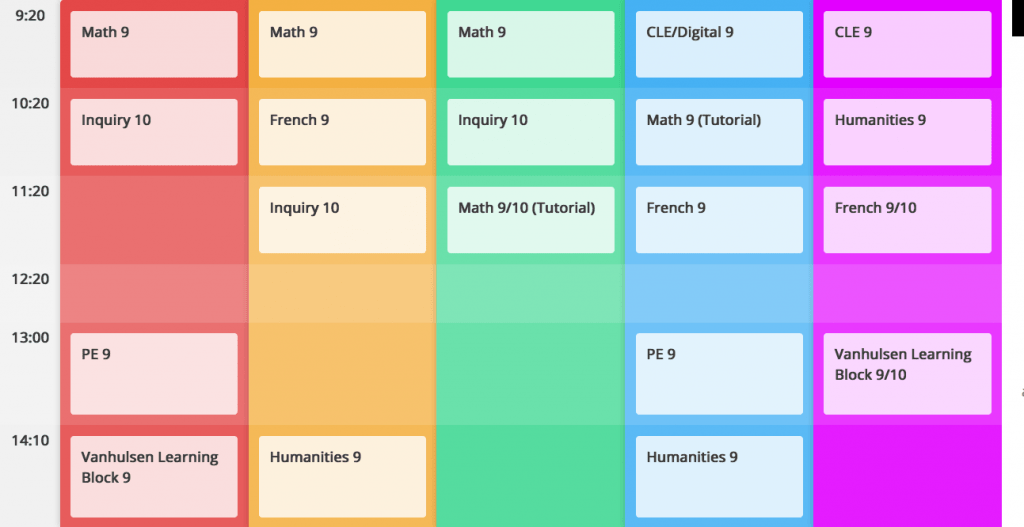
A grade 9 schedule in 2018. Tutorial times and Vanhulsen Learning Blocks feature prominently. If a student is caught up in their work, they can use these times as further DCL.
Similarly, Diana Vanhulsen, our student services teacher, began to hold learning support blocks. Students could use these blocks as quiet work spaces with support to manage their schedules and assignment lists provided there and then in-person. This was in addition to Ms. Vanhulsen job of following up with students with a significant number of outstanding assignments and helping them through their tasks, sometimes sitting down and leading them through an assignment.
Not all the changes made for the sixth year were improvements, however. For the previous few years, we’d been slowly cutting down the lunch block, from originally an hour, down to forty-five minutes, then forty, and finally, in this sixth year, twenty minutes, so as to make more time for a five-block schedule with more DCL and a wider diversity of electives. The effects of this were immediate and disastrous: With so little time to prepare and eat their lunch, students no longer had the time for clubs such as Gay Straight-Alliance (GSA), formal Leadership, and Larp; At the same time, students who had DCL blocks immediately after lunch would end up using them as an extended lunch. Evidently, a balance between unstructured (DCL) and actually free (lunch or break) blocks is incredibly necessary.
Year 6 saw the introduction of another event with staying power at iHub: Our student-led student showcase iHub Spotlight.
We’d been wanting to hold a showcase event of student inquiries and IDSes for a long time, but now that we’d comfortably expanded the scope of iHub Open and led our first Roadshow, we felt it was finally time. Unlike previous in-school events, we started out not with teacher direction or design, but instead asked students to lead the event from beginning to end. Finally, in late February, the event was held, with three main stage sessions (two of them stand-up presentations, the other a return of the wildly successful interview session from Open) and five hours where parents and members of the community could wander around and talk with any of our nearly 60 students about their projects. Not once during the event did a teacher present: We’d learned to trust them with every element, from planning to promotion to the actual presentation of the night.
Onward (Year 7 — 2018-19)
When you’re doing amazing things, it’s important to keep doing them, and to keep making them more amazing. And when you’re professing to believe that other people could do the same amazing things, proving that you can keep doing them is the first step towards demonstrating that what you’ve done can be replicated.
For us, our sixth year was not a one-time thing. This year, we’ve led a second, student-organised, upgraded Roadshow, and we’re already thinking of its future no longer being about Inquiry Hub or even high school, but just being about entertainment and a chance to wonder at amazing things. We’ve held another iHub Open on the same scale as the previous year, this time with further polish we’d missed last time ’round — the students running tech for the show are always learning more about their craft. And we’re looking forward to having not one but two iHub Spotlights this year, the first to be held in February.
Furthermore, when you’re doing amazing things, and you know other people can do them and the world would benefit as a result, it’s your duty share. That’s why students and teachers are working together to develop future initiatives to spread iHub’s philosophy not only further into education, but out into other parts of life as well. Projects like a podcast version of iHub’s in-house student-organised speaker series and the creation of student-written textbooks from for schools BC-wide to use are just a few examples of this.
Looking back at our first two years, we leaned heavily on the creation of the school garden as the model of a well-executed student inquiry project. It was student-led and brought the community together. It required mentors in addition to supportive teachers. It needed to acquire funding and equipment as well as approval from the school district. Moreover, the students shared their learning online and through presentations. The garden project was the gold-standard of what Inquiry Hub might accomplish and its legacy continues.
Of course, we realised early on that most student inquiries were not going to match the scope and significance of the garden project. However, gradually, the students were able to find their own successful projects. A couple of students got into 3D printing, built their own 3D printer, and eventually went into Applied Sciences at a local university. Another student, interested in computer programming, learned to design a virtual piano keyboard using Unity and interfaced it with a LeapMotion controller. He eventually went on to study Computer Science at a post-secondary school. And two students collaborated to obtain funding, design, and paint a mural for the garden.
That was years ago. Nowadays, every year when students start filming and editing that year’s video look at inquiry projects, they’re stuck with too much footage, too many good projects. For students with a good sense for the feeling of boredom and, correspondingly, a strong desire to keep all video content short, this is becoming an increasingly large problem.
Inquiry Hub might be an experiment, but it’s an experiment that has succeeded. Not only for the staff and the people who first suggested the idea, but most importantly for the students who have used this chance to take control and be a part of the wider world… a school-in-the-making as well.
In November, Evan Kehoe, an iHub grad from a couple years previously dropped by to check back in. But when he stopped in, he didn’t just bring his characteristically unbelievable stories from work that he’d been known for even when still at iHub — He brought a cheque for $5000 as well. Four years ago, when we had gotten $7000 from the Ken Spencer Award, he’d been the one to make the case for buying the live sound mixing desk with it. Now, the same process that bought the mixing desk and the dozens of other things students needed four years ago will be used again in dividing up Evan’s donation. Students will pitch for what they need, and the school will make the purchases.
iHub’s gone from organised seminars in the morning and “Inquiry Time” in the afternoon, to something so much more important. We knew even then that, if you let students what they really were passionate about, they’d be able to learn more about everything else as well. We knew that it was possible to trust students with their time and their projects, and that doing so would be more advantageous than control. What we’ve learned about is how we do that… And why we should do it too.
iHub has become a place for creatives because it had to. People don’t use their time well unless they believe in how they’re using it, and people believe in what they’re passionate in: What they themselves create. That’s why students are so passionate about iHub: Because they’ve helped to create it.
Learners learn best when they’re creating. Sure, you can dream and you can learn all you want, but if you don’t connect the two, then there’s hardly any point. If schools are meant to prepare students for the future, they should have hope for it too, and hope is found best by letting students bring their dreams to life now. Some might say school should just be about Learn, but at iHub, we know that all three are important:
Dream. Create. Learn.
